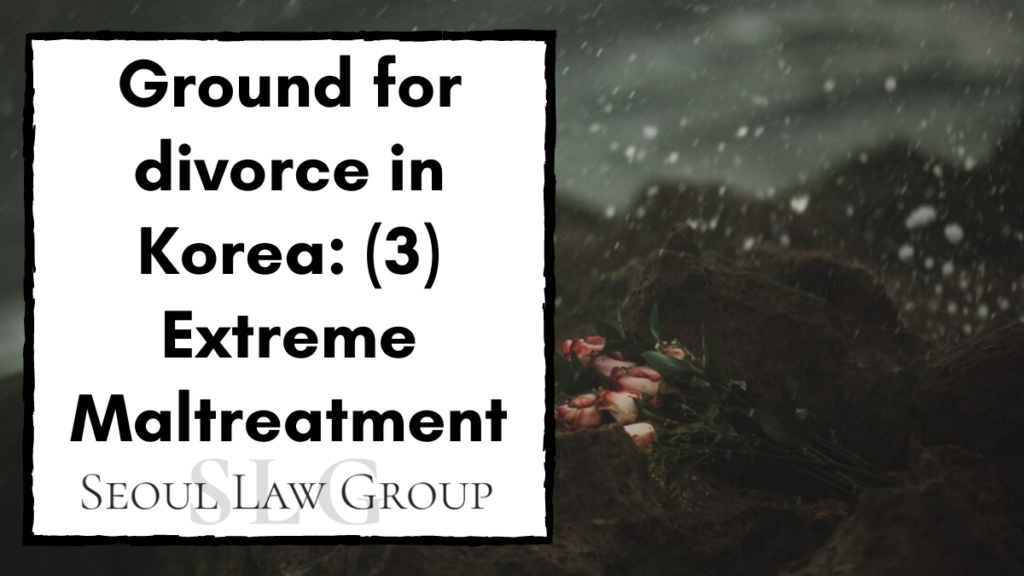Civil Law, Article 840 (Causes for Judicial Divorce)
Either husband or wife may apply to the Family Court for a divorce in each case of the following subparagraphs:
-
-
- If the other spouse has committed an act of unchastity
- If one spouse has been maliciously deserted by the other spouse
- If one spouse has been extremely maltreated by the other spouse or his or her lineal ascendants
- If one spouse’s lineal ascendant has been extremely maltreated by the other spouse
- If the death or life of the other spouse has been unknown for three years
- If there exists any other serious cause for making it difficult to continue the marriage.
-
The third and fourth grounds for divorce in South Korea are, to be simple, about domestic abuse. If a person gets “extremely maltreated” by their spouse or their parents / grandparents, or if a person’s parent / grandparent get “extremely maltreated” by the person’s spouse, it is a ground for divorce.

The reason why the Korean Civil Law listed “Extreme maltreatment by spouse’s parents or grandparents” (as well as abuse by the spouses themselves) as a ground for divorce, is because Korean wives were traditionally expected to live together with their in-laws. Even though time has changed, and it is becoming less and less common, wives getting abused by parents-in-law was and still is a serious social issue in Korea. So, the law stipulated “Extreme maltreatment by spouse’s parents and grandparents” as one of grounds for divorce, so that wives would be able to claim divorce if they got maltreated by their in-laws.
The difficult part is to decide which is “extreme maltreatment” and which is not. It would be simple if the victim were beaten or stabbed by their spouse, but sometimes maltreatment can happen without direct physical violence. The Supreme Court interpreted that “extreme maltreatment” is “Violence, abuse, or insult, severe enough that continuing the marriage is cruel to the victim.” (2003Me1890 delivered on February 27, 2004)
According to the Supreme Court, these are recognized as “extreme maltreatment.”
- The husband pressed false charge against his wife with adultery (which was a criminal offence in Korea at the time) even though she was innocent. He even asked two people to give false testimony against her. (88Me504 delivered on February 13, 1990)
- The wife falsely accused her husband that he was insane, even though he was not, and tried to get him confined to mental hospital against his wish. She even barged in while he was teaching in the classroom and handcuffed him in front of students. (85Me51 delivered on November 26, 1985)
- The husband tried to coerce his wife, saying that she must agree to divorce or else he would commit suicide. He made a huge commotion of drinking poison twice, which made the wife eventually give up and go live with her parents. (90Me484 delivered on November 27, 1990)
According to the Supreme Court, these are NOT “extreme maltreatment.”
- The husband hit his wife, but it was because the wife committed adultery and kept running away from home, even when the husband forgave her and tried to talk to her to come back. (86Me56 delivered on September 9, 1986)
- The wife cursed and swore to her husband, visited his workplace to cause trouble, called the workplace to insult him. But it was because he sued her for divorce, which was dismissed, and kept being in a relationship with another woman even after the dismissal. (89Me785 delivered on October 13, 1989)
- The wife scratched the face of her father-in-law with her fingernails and stabbed him with a piece of steel chopstick. But it was because she grew mentally ill from overworking in the farm and taking care of bad-tempered father-in-law. She got better after getting a proper treatment. (84Me49 delivered on August 21, 1984)


Some really nice and utilitarian information on this website , as well I think the style contains fantastic features.
Thank you for your kind words. If you require any assistance with your legal matters, please do not hesitate to reach out to us via email at info@seoullawgroup.com. We are here to assist you.
I¦ve recently started a website, the information you offer on this website has helped me greatly. Thank you for all of your time & work.
We appreciate your gracious words, and we remain committed to continuous improvement. If you ever have any legal inquiries in the future, please do not hesitate to contact us at info@seoullawgroup.com. We are here to assist you with any questions or concerns you may have. Thanks you for your support.
Simply a smiling visitant here to share the love (:, btw outstanding design.
Thank you for your kind words. If you require any assistance with your legal matters, please do not hesitate to reach out to us via email at info@seoullawgroup.com. We are here to assist you.